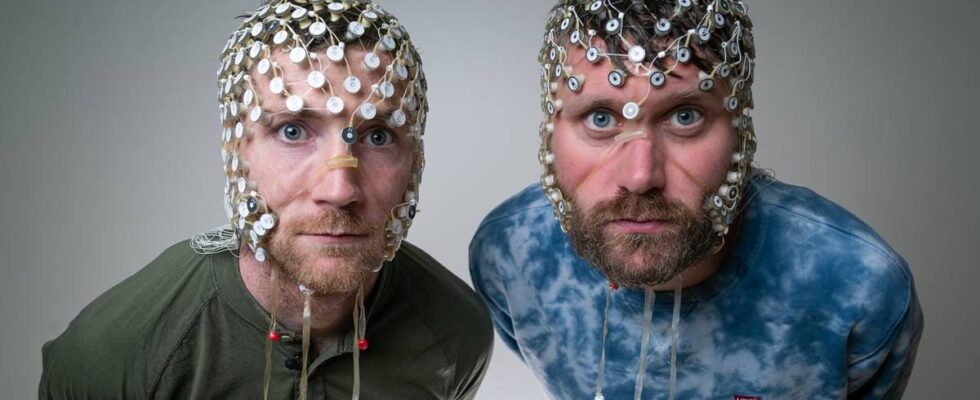– I didn’t have high hopes for the research track. Would it matter so much to put away the screens? That’s what Sven Bisgaard Sundet says, who together with Michael “Mike” Stilson has been logged off since September last year. This has become the news series “Avlogga”, which premieres on Tuesday 8 October. A whole year logged off. No “when gen Z write the script” and abrupt buzzers, no payment of bills in the app, no tipping. Zero smartphone and internet. So, no screen at all! It’s giving ✨unlogged✨. What has this done to the brains of Sven and Mike? More than one would think. – That was the coolest thing. I think both Mike and I were very surprised, says Sundet. Increased brain activity Throughout the year, Sven and Mike were tested three times: Just before they signed off, after six months and just before they signed on. They put on a cap with 256 electrodes that were supposed to map brain activity. – Between test 1 and test 2 we found a tremendous increase in brain activity, says Audrey van der Meer who is a brain researcher and professor of neuropsychology at NTNU. Many more connections have appeared in the brain between test 1 and 2. Photo: Øivind Olsson / news So many more connections had appeared in the brain. Larger networks in the brain were active when they had to solve a task. – I believe that when the brain has the opportunity to be a little bored without being entertained by a screen, that the brain simply starts to work better, says the researcher and continues: – When the whole brain is involved in a task, the brain needs to communicate between the various parts. Between test 2 and test 3, fewer connections remained in the brain. – When we tested them again, there were slightly fewer connections between brain networks, but the connections that remained were stronger than before, says van der Meer. The networks that were not relevant were removed, while the networks that remained were strengthened. Everyday tasks Today, many of the tasks are done over the phone. What’s the name of that song over there? When does Egon close on Solsiden? Did I remember to pay that bill? – The brain should sue the smartphone. The smartphone does all the tasks that the brain used to do itself, says Sven Bisgaard Sundet and continues: – 50 years ago you had to remember things yourself and write them down. Now you have a to-do list on your phone. Not least maps. How often do you pull up Google Maps to find your way somewhere? Instead of following a blue dot on the map, they now had to look at the signs. Perhaps they remembered a building from earlier? For example, they were in the South Korean capital Seoul without a smartphone. – I have steel control in Seoul now, says Sundet. Everyday tasks for which one used the phone now had to be done analogically. Photo: Vegard T. Blakstad / news Surprising findings – I was very surprised by the changes from test 1 to test 2, that there was such a dramatic increase in networks in the brain, says neuroscientist van der Meer. She says that you are used to seeing great brain development in the first two years of a person’s life, but that it is quite interesting that it also happens in adults. Brain researcher Audrey van der Meer saw a tremendous increase from test 1 to test 2. Photo: Vegard T. Blakstad / news Can we conclude that logging off actually contributes to very large brain development? – It will be difficult to draw big conclusions, but the fact that both test subjects show a trend with the same results, with violent increases, says something. But that doesn’t say everything, she says. Mike and Sven have talked to each other about whether they want to continue their lives logged off. Mike has taken the phone into use, but Sven is waiting: – The mobile is still hanging in the glass frame on the wall, and I hope it will stay there. But I fear that it will end up in my pocket one day. Published 08.10.2024, at 05.37
ttn-69
Was mobile-free for a year – this did it to the brains of Sven Sundet and Mike Stilson – news Trøndelag – Local news, TV and radio

